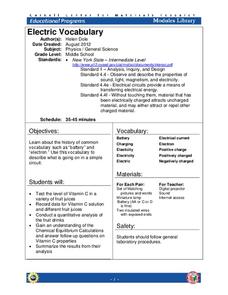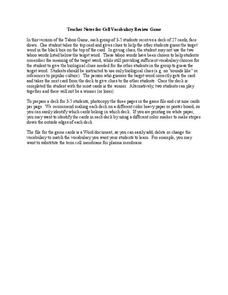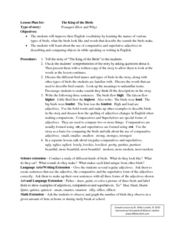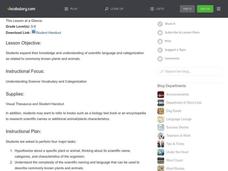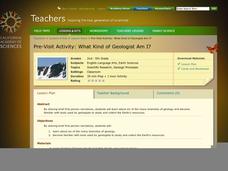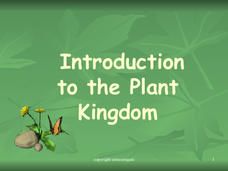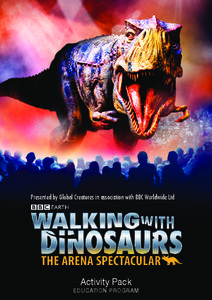Cornell University
Electric Vocabulary
Practice electric vocabulary using multiple methods. Learners begin by watching a video that explains vocabulary related to electric currents. They match vocabulary cards to practice and then create an electric circuit. Using the...
Serendip
Cell Vocabulary Review Game
Can science scholars describe a nucleus without mentioning DNA, or a chloroplast without mentioning the color green? Test their organelle understanding through an exciting card game. Groups take turns guessing the correct organelle or...
Serendip
Molecular Biology Vocabulary Review Game
Getting bored with the typical review strategies? Why not turn it into a game! Learners practice their DNA vocabulary by trying to get their partner to guess the word they're describing. To complicate things a bit, there are words that...
Curated OER
The King of the Birds vocabulary
Science and language skills come together in The King of the Birds. After reading, discuss the names and types of birds in the story and write given sentences to portray the difference between comparative and superlative adjectives....
Curated OER
Understanding Science Vocabulary and Categorization
Students analyze scientific vocabulary words. For this life science vocabulary lesson, students complete a worksheet using VisualThesaurus as they evaluate words related to plants and animals and how the words are used.
Curated OER
Seahorse Vocabulary
In this recognizing facts about seahorses activity, students read descriptive phrases and match them with the terms they are describing. Students match 9 answers.
Curated OER
Understanding Science Vocabulary And Categorization
Young scholars explore and examine scientific language and categorization as related to commonly known plants and animals. They hypothesize about a specific plant or animal, how it was scientifically named, what concepts and vocabulary...
Curated OER
"Snapshot" Exercises & Sensory Detail Word Bank
Read a sample of creative descriptive writing to your science class. Discuss how writing can be used to record and communicate observations that scientists make. Reading selections and thought-provoking questions are suggested. Also...
Project Noah
Writing Goes Wild
Young scientists develop their observation and writing skills as they craft and then post a detailed description of a plant or animal they have spotted and photographed.
Curated OER
Science Vocabulary List
In this science vocabulary worksheet, students fill in the missing letters to science vocabulary words that match the definitions next to them. Students fill in letters for 15 words.
Curated OER
Body Parts Vocabulary
Students identify the main parts of the human body. In this human body vocabulary lesson, students trace each other's body outline on butcher paper and label the parts of the body. Students define what each body part does. This lesson is...
Curated OER
Ecosystem Vocabulary
In this ecosystem worksheet, students read descriptions and match the appropriate vocabulary term using ecosystem, habitat, community, and population. Students identify ten vocabulary terms.
California Academy of Science
What Kind of Geologist Am I?
Transform your class into young geologists as they learn about six different branches of geology. Using the included geology career descriptions and picture cards, learners work in small groups deciding which tools and locations fit...
Biology Junction
Introduction to the Plant Kingdom
Plants provide humans with food, shelter, and medications. Scholars gain a better appreciation for plants after learning their functions, divisions, and early ancestors. Each sub-topic includes slides highlighting vocabulary and...
Curated OER
It Matters
Learners use descriptive vocabulary to discuss the attributes of matter. Then, they sort objects or pictures by the type of matter they are comprised of. Finally, students match objects of matter with similar attributes and create a...
Curated OER
Introduction To Anatomy Quiz
Test your class on anatomy vocabulary words with this quiz. Pupils identify various parts of the human body by choosing the correct term for each given description. This is a basic multiple choice quiz with 10 questions. Class members...
American Museum of Natural History
Life in the City
Believe it or not, biodiversity exists even in areas of disturbed habitat. An interactive activity challenges learners to look for species with a magnifying lens in an image of a city habitat. Pop-up images and descriptions explain how...
Prezi
The Six Kingdoms
Why can't dinosaurs clap their hands? Because they no longer exist. The six kingdoms do exist, and through the presentation individuals discover kingdom names, their description, and view photographs of a few samples.
Bowels Physics
Electric Circuits
Investigate the construction of the electric circuit with a thorough presentation that provides a solid background for each type of circuit. After introducing key vocabulary, the lesson goes on to explain circuit design.
Alabama Wildlife Federation
Water Words
Water is an interesting substance that all living things need to survive. Learners focus on the characteristics of water as they create a list of words related to water and then incorporate them into descriptive paragraphs. They then use...
Curated OER
Describing Physical Appearance: ELL
In this physical descriptions ELL worksheet, students complete several activities to help them describe people. Students draw and read the descriptions aloud with a partner and to their class.
Curated OER
DNA Vocabulary Review
In this DNA worksheet, students review vocabulary words associated with DNA, DNA replication, and gene expression. This worksheet has 13 matching questions.
BBC
Walking with Dinosaurs
Breath new life into your class's study of dinosaurs with this extensive collection of materials. Offering everything from a printable T-rex mask, word searches, and connect-the-dots activities to informational handouts, hands-on...
California Academy of Science
What's on a Penny?
As a lesson on scientific observation, have your class investigate the features of a penny and a nickel. Working in pairs, they practice writing detailed descriptions using their senses and a ruler to gather information. This is an...
